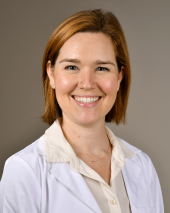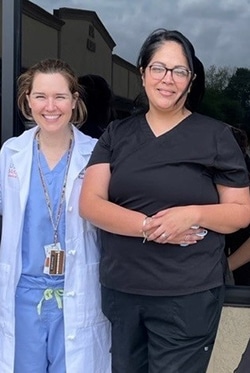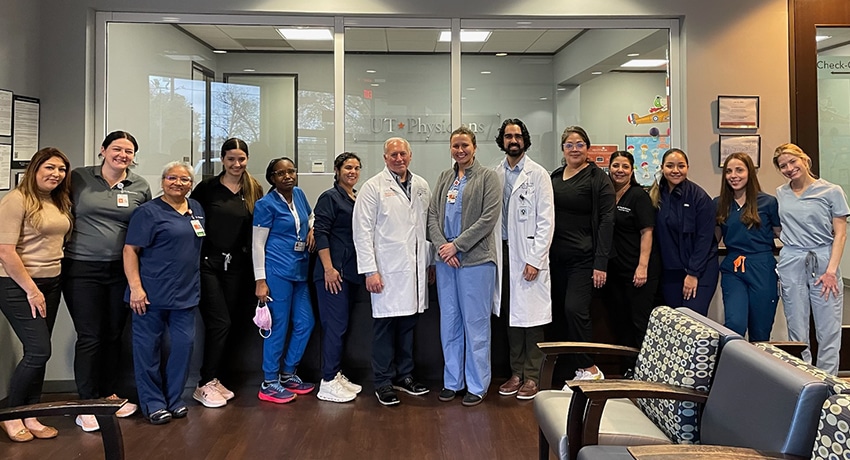“When you find something so precious, you want everyone to know.”
Those are the words from cervical cancer survivor, Juana Espino, who now serves as project coordinator of the Houston PAP Project. This UTHealth Houston program provides no-cost cervical cancer screenings to a predominantly Hispanic population. Espino has become instrumental in sharing her testimony and encouraging other Hispanic patients, like herself, to get screened, as a result of her journey.
“I never used to know my purpose in life, then I went through everything, and I feel like it was for something,” Espino said. “Now I can help people, tell them there’s hope, and that there are people who can help. That’s why I’m grateful to be a part of Houston PAP Project.”
The power of community
Houston PAP Project offers no-cost cervical cancer screenings one Saturday nearly every month at two clinics: UT Physicians Multispecialty Clinic–Jensen and UT Physicians Multispecialty Clinic–Rosenberg. The acronym in the name, PAP, is two-fold: referring to the cervical cancer screening test itself, the Papanicolaou smear (Pap test), and to the project’s mission statement in Spanish: Prevenir, Ayudar, Poder (to prevent, help, and be able).
Serving a nearly 100% Hispanic and Spanish-speaking population, the project aims to provide necessary cancer screening to women who struggle with access to health care. The clinics provide not only cervical cancer screening but also follow-up testing and treatment. This includes services such as colposcopies and excisional procedures for cervical precancer. Patients are navigated to treatment if cervical cancer is diagnosed.

“We want these clinics to be a very welcoming environment,” said Abigail Zamorano, MD, gynecologic oncologist with UT Physicians and assistant professor at McGovern Medical School at UTHealth Houston. “There is a lot of fear and anxiety about pelvic exams and cancer screening, so we try to normalize it as much as possible.”
Zamorano helps spearhead the initiative, coordinates medical students and providers, and is one of several physicians who offer services at the Saturday clinics as a volunteer. Through research and experience with clinic attendance, Zamorano has learned that encouragement from a friend or family member is the main motivator for women to attend the screenings. The power of communication within a community is vital, she said.
“A lot of our outreach is centered around grassroots community efforts, handing out flyers at schools, churches, and sometimes grocery stores,” said Zamorano.
Healthcare Transformation Initiatives partnership

The Healthcare Transformation Initiatives (HTI) team with UTHealth Houston took on the Houston PAP Project as a department to provide guidance and assistance.
“It’s definitely a team effort,” says Xochitl K. Olguin, project manager of Houston PAP Project and HTI. She said the project’s success depends on a large group within HTI, clinic leaders, community health workers, medical students, as well as the physicians and nurses who volunteer their time at the screening clinics.
HTI continues working to improve the Houston PAP Project by seeking out additional grant funding and adding partnerships. Mobile mammography is one example, expected to begin later in the year. Olguin hopes the program can expand into additional UT Physicians clinics in the future to help even more women.
“Our department is a perfect fit for the Houston PAP Project,” Olguin said. “Our goal is expanding access to health care, and this is just a natural evolution for it.”
Olguin describes Espino as the heart of the project, based on her background as a cancer survivor, her understanding of the women and their Hispanic culture, and her motivation to help others.
“She is so driven to help as many women as possible, and she is a superstar,” Olguin comments. “The way she communicates with the women, reassures and educates them, is inspiring to witness. She’s phenomenal.”

Detecting cervical cancer and saving lives
In 2023, 250 women received no-cost cervical cancer screenings through the Houston PAP Project. Of those, 10 women learned they had high-grade precancer and were treated to prevent the progression to cancer.
“There is no point in screening for cervical cancer if people don’t do anything about the findings,” Zamorano said. “I’m proud we have developed this model to reach these patients and provide the care they need so they can continue to live their lives and not be affected by this.”
The team has realized that having someone like Espino share her personal story with patients helps them have the courage to get screened and follow up on abnormal results. Espino helps counsel patients, translating to an almost 100% follow-up rate.
Zamorano has always been interested in global health and health care delivery to underserved populations. She has spent time working in Peru, Uganda, Guatemala, and Haiti, so the Houston PAP Project fits perfectly into that focus.
“However, you don’t need to go across the world — you can find ways to help right in the neighborhood,” Zamorano said. “We mapped out where our patients live and most are right around the corner from many of our hospitals. The Houston PAP Project is trying to bridge this gap.”



